EXCLUSIVE: ‘Care not Kill’ Rally showcases the slippery slope of Euthanasia
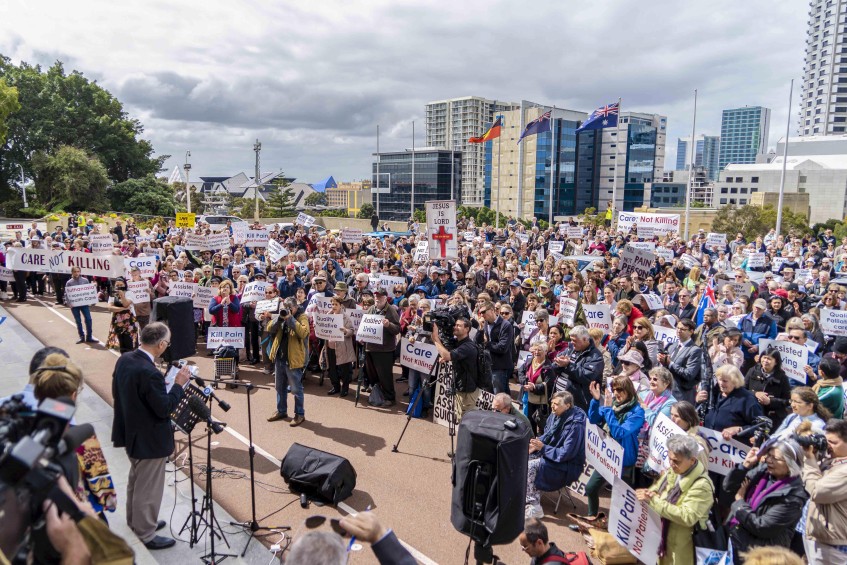
Protestors and supporters gather peacefully outside Parliament House for the 12 noon CARE: Not Kill rally on Wednesday, 4 September. Photo: Josh Low.
By Eric Martin
The steps of Parliament House were once again the scene of a rally this week Wednesday, 4 September with more than 1000 attendees joining together in defence of the sacredness of life.’
People from across Perth – including many Perth Catholics – were attending the rally to voice their concern to the introduction of assisted dying legislation.
The State Government's assisted dying bill was this week on Tuesday night overwhelmingly supported by representatives in the Lower House of Parliament, with the first vote on the proposed legislation showing a clear majority of 44 votes in favour to 12 against.
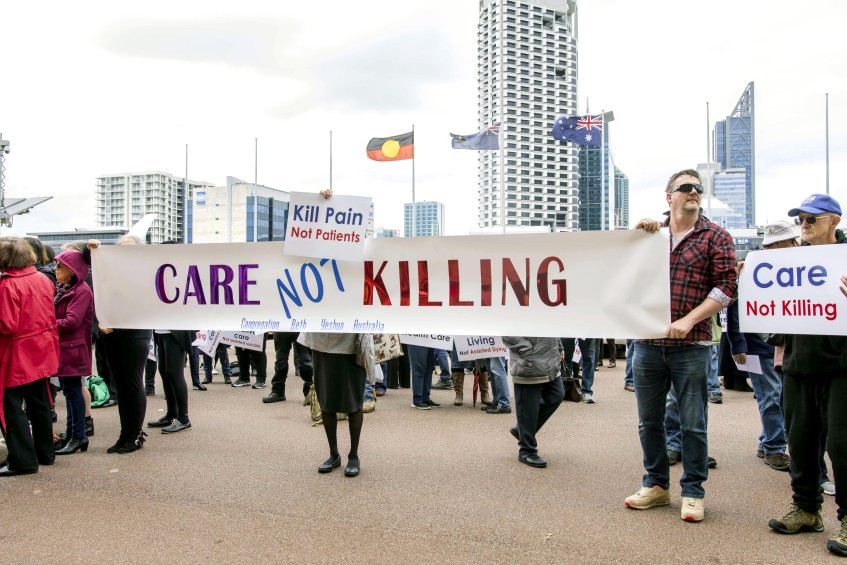
A focus on prevention and support through improving palliative care for all Western Australians was a crucial focus of the presentations. Photo: Eric Martin.
The bill now goes before WA’s Upper House for debate where it is expected to face its biggest challenge in being approved: no Liberal in the Legislative Assembly has said they will support the laws, despite popular media reports citing 88 percent support for the bill among West Australians.
According to the Leader of the Opposition, Lisa Harvey, the voting procedure carried on until 1am (and will likely do so on Thursday and Friday night), calling into question the focus and discernment of any political outcome that is thrashed out at a time when exhausted members should be at home resting.
“Is that a safe way to be running a debate like this where emotions run high? I think it’s ridiculous. We haven’t had this legislation in place in Western Australia in over 200 years – why do we have to sit here through the night to get through this debate?
“We need to show due diligence to this legislation.”
“I do (feel rushed). I know there are people who want to access this but the reality is, it can’t be put in place until a change program has been implemented, so it’s at least two years. There is no immediacy for it and for the first time in 200 years? We need to get it right.”
Opposition Leader, shadow treasurer Dean Nalder and senior Labor figure Bill Johnston were among 12 MPs to vote no to assisted dying.
Though some 60 police were in attendance (in anticipation of counter-protests and potential clashes), the demonstration was peaceful and respectful.
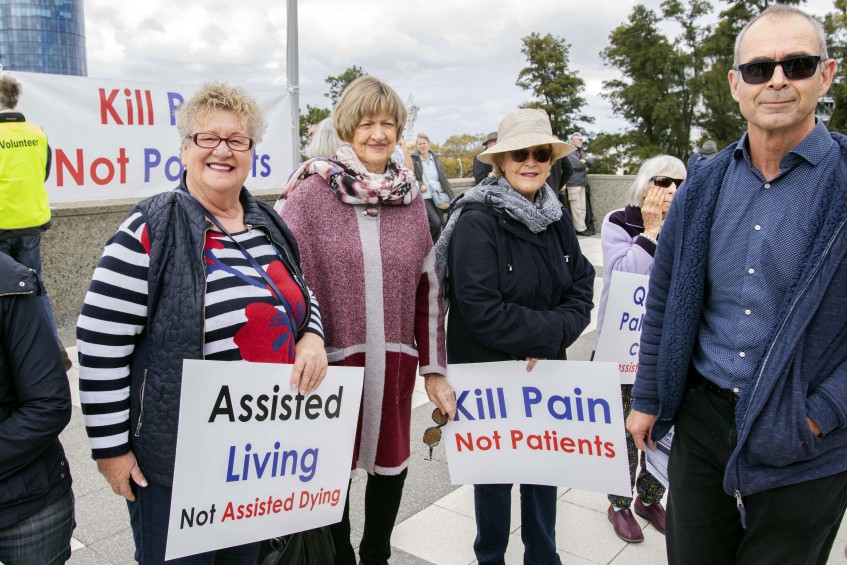
Victory Life Pastor Margaret Court was in attendance, lending her considerable support to the cause. Photo: Eric Martin.
Though not an official speaker at the Rally, Margaret Court, Pastor of Victory Life Church and well known commentator on same sex marriage and the importance of religious freedom, was also in attendance.
“Even the medical doctors here are against it,” Mrs Court said.
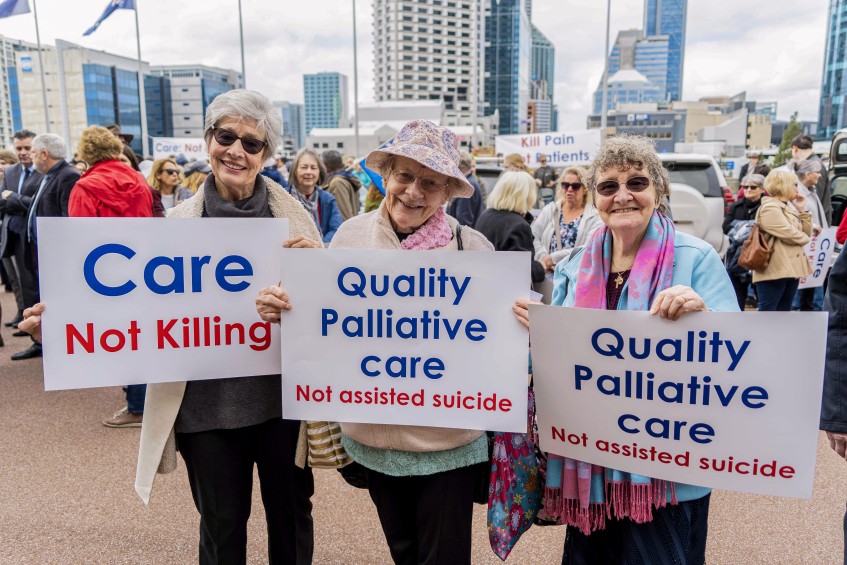
Peaceful protestors hold placards showing their support for palliative care as the preferred treatment option for the elderly. Photo: Josh Low.
“You’re not seeing the doctors on television having the same coverage as somebody who is appealing for assisted suicide… there is a sympathy side and yes, people do go through horrific things in life, but we’re following the sympathy side instead of saying no.
“Because as long as people have hope there is life,” she explained.
“I don’t think they have considered this debate in light of (the religious freedom laws) … I don’t think we should ask anyone to do anything that goes against their Christian beliefs or against the Bible.”
“God breathed life into people and he’s given us a long life, and when we know him we can go through things in life but we know that there is always a way through, in him.”
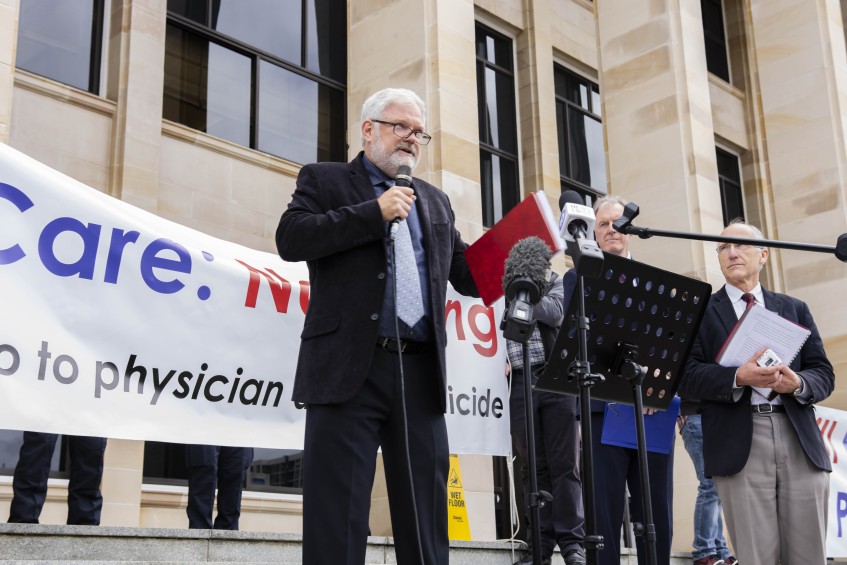
Fatal Flaws filmmaker Kevin Dunn delivers a dynamic presentation to the CARE: Not Kill rally. Photo: Eric Martin.
Canadian filmmaker Kevin Dunn, who has travelled the globe speaking to those affected by recently (and not so recently) introduced Euthanasia laws, such as Oregon, Canada and the Netherlands, where voluntary assisted suicide has been in place for 20 years.
“As soon as these laws are introduced it’s inevitable that the house of medicine is going to see this as a potential treatment option,” Mr Dunn said.
“We know that even a year after the law was passed in Canada we have cases where people with disabilities were in the hospital and in very distressing circumstances, where doctors were coming in and saying ‘do you know how sick you are? You have the opportunity now…
“Now they’re not supposed to do that, but in some places around the world and including some of the legislation here in Australia, doctors can bring it up as a suggested type of treatment,” he explained.
“The problem is, is that these laws hit us at our lowest, when we have just been diagnosed as terminal, when death seems imminent.”
